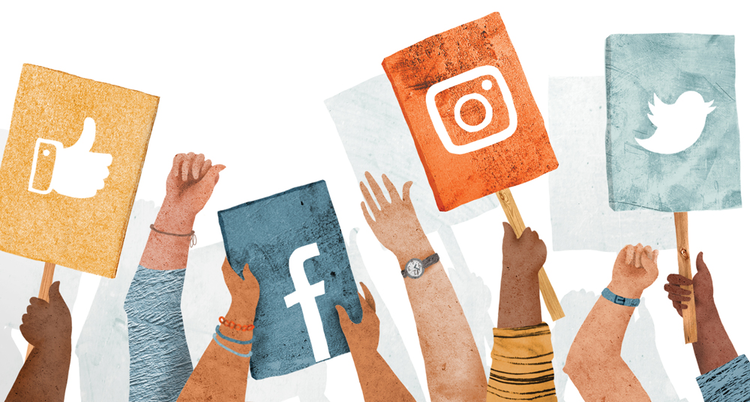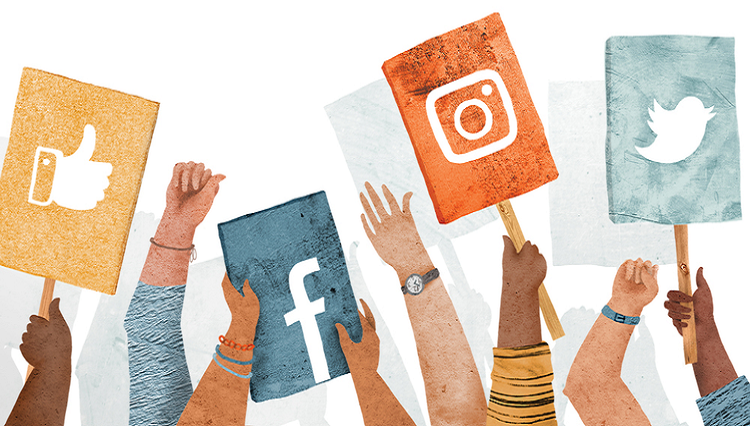
Source: Better Humans
Author: Ragen Chastain
The social justice issues in our world right now can seem overwhelming, with administrations firmly embracing white supremacy, xenophobia, homophobia, transphobia, ableism, and more. History has shown that activism is a way to create change—but it can also be another factor in creating overwhelm.
From struggling and stressing about what problem we should work on, to burnout from trying to work on all the problems, activism can end up feeling like a drain on our (typically already-limited) resources. This increases exponentially for those who are in marginalized communities, especially when we are trying to advocate for our own rights.
There is an option. We can leave behind war-time advice about “choosing our battles” and instead choose to engage with activism on our own terms. We can, in fact, seek to transform our activism from an energy drain into a self-care practice.
The first step to this is to understand a basic, if difficult, truth: We can never control the outcome of our activism.
It doesn’t matter if we’re trying to change the mind of a friend or trying to change the practices of a major corporation. We can choose to participate in activism, but we are never guaranteed an outcome. Indeed, social justice activism often takes generations, with victories few and far between.
To borrow a phrase from Max Weber, “activism is the slow boring of hard boards… it takes both passion and perspective.” If we let go of our attachment to an external outcome, we can instead focus on an internal outcome. We don’t have to be driven by what we can accomplish; we can be bolstered by what activism does for us.
I’m a long-time activist. I’ve always felt compelled to act whenever I saw something that seemed unfair. I led my first protest in kindergarten and almost all of the trouble that I got into in school can be traced back to me trying to change something I felt wasn’t right. In college, I seriously committed to social justice work, including anti-racism work and LGBTQ activism. In my early thirties, I started doing Fat Activism and committed myself to that work full-time eight years ago.
I’ve given hundreds of talks and workshops at some of the most prestigious universities, conferences, and corporations, written over a thousand blog posts and articles, led national protests and petitions, and coordinated conferences. I receive and answer around 10,000 e-mails per month asking for education and/or support. I’m committed to intersectional activism, so I’m also involved in activism against racism, ableism, xenophobia, homophobia, transphobia, classism, and more.
Through this, I’ve developed a large following of online trolls and cyberbullies (the largest community that exists to troll me specifically has over 6,000 members, and last year held their own awards for best trolling of me — they gave out prizes and everything.) One question I get asked a lot is how I deal with all of it.
The answer is complicated. First of all, a lot of it has to do with privilege, and I don’t want to discount that. But another reason I believe I’ve been able to do this work at this level for so long is that, for me, activism is a self-care practice.
Again — we can never control the outcome of our activism. We can only have some control over whether or not we do it. Accepting that is key in defining goals and what we consider victories. With this perspective, our goals become about finding ways to speak up, and our victories become about taking the actions themselves—achievable goals.
With that in mind, these are the tactics that have been most useful to myself (and others I work with) in turning activism into a self-care practice.
Say It and Go
In January of 2012, I created a Facebook group called Rolls Not Trolls that now has nearly 1,200 members and has done tens of thousands of works of activism.
Here’s how it works — a group member posts a link to an article/comment thread that is rife with fatphobic sentiment. Other group members follow the link and leave a comment that gives a view that is not based on weight stigma and that expresses a body positive/fat positive viewpoint. And then we leave the thread.
And never go back.
And it’s the last bit that is the key here. When you are a social justice activist you can easily find yourself in something that is simply your adversary’s exercise in intellectualizing bigotry. You can find yourself repeatedly debating over whether or not you have a right to exist. Your adversaries don’t have this same emotional investment—their ability to exist without shame, stigma, bullying, and oppression is not at stake. That means they aren’t emotionally drained by the discussion the way you are. Indeed, internet trolls are often the kind of people who try to gain self-esteem by harming others. They’re energized by the argument that depletes you.
There can often be pressure for us to enter into these debates, born from the mistaken belief that if we think we deserve to exist in peace like everyone else, we are obligated to debate for that right with anyone who has internet access and a penchant for fat-shaming.
Rolls Not Trolls is about rejecting that notion. We can choose to interrupt bigotry with a message of equality, and then leave and never give the bigots another thought. We can be happy that anyone reading the thread will now be introduced to a different point of view, without taking responsibility for whether or not people choose to liberate themselves from weight stigma.
As Cara H., a member of the group, explains
It’s bad for my mental health to argue with trolls, but if I don’t say anything, that will eat me up and I’ll end up berating myself.
Embrace “Slacktivism”
“Slacktivism”, also known as “Arm Chair Activism”, is a term that’s typically used to describe small actions that can be taken from one’s home — signing an online petition, liking and/or sharing a post from another activist, commenting on a thread in social media, etc.
Those labels reveal an attitude towards these forms of activism that is completely ableist and classist. There is any number of reasons that someone is better off doing activism from their home on their terms. Marginalized people tend to have fewer leisure hours. Black people may be unsafe at events that have a police presence. In-person activism events are not made accessible to fat and disabled people. There can be tremendous effort involved in getting to these events and participating in them for some disabled people, people for whom crowds/face-to-face interactions are difficult, and those with chronic illness and pain.
The labels also imply that these forms of activism are ineffective, but that’s not the case. Slacktivism can create serious change. Recently Amtrak tried to charge two disabled passengers $25,000 for what would have been a $16 ticket. The passengers when public on social media, the story went viral, and Senator Tammy Duckworth got involved. Amtrack backed down. That was all driven by “slacktivism.”
Furthermore, a study by Georgetown University in 2010 found that those who engaged in these small bits of activism were more likely to be involved in everything from attending events, recruiting, volunteering, and buying products. In fact, they were over 50% more likely to do something additional for the causes they support. Even if the effort seems small, that effort can have a compounding effect and help you live a life that is more aligned with your own values.
This type of activism — with its quick action and low levels of commitment—makes activism more accessible to more people, making activism as self-care an option for more people. And it’s a way for anyone to experience a quick and surprisingly valuable “win”.
The increase that we see in activism from those who engage in “slacktivism” may be explained by The Big Billboard experiment that Robert Cialdini described in his book “Influence: The Psychology of Persuasion.” In the experiment, two groups of people were asked to put a large, ugly billboard in their yard touting the importance of safe driving.
Those in group two were about 400% more likely to agree. The difference was that a few days previously, researchers had asked people in group two to display a small postcard about safe driving.
The researchers found that taking that small action changed the way that people felt about themselves. Once they saw themselves as advocates for safe driving, they were much more likely to take a larger action.
The main point here isn’t the fact that people were likely to take more and larger actions. The point is that people changed the way that they felt about themselves. This is especially important for those who are dealing with oppression. Of course, oppression isn’t our fault, but it becomes our problem, and moving our self-concept from “target of oppression” to “activist against oppression” can help us be an important form of self-care.
Using Activism to Strengthen Us
This is where the rubber meets the road in using activism as self-care — making it something that strengthens us, rather than depletes us. How we use the techniques above can make the difference in whether we’re using activism for self-care, or if activism becomes something that drains our time, energy, and resources.
Let trouble find us
One key to this process can be making activism a more reactive experience. So it’s not about going out and searching for injustice to address, or deliberately addressing injustice (those are important, but separate, forms of activism). It’s about reacting to injustice when we see it. This is important because these injustices can come at us unexpectedly — we are just scrolling our Facebook, checking our e-mail, or standing in line at the grocery store, and looking at magazine covers and we get hit (metaphorically) with an injustice.
It can immediately cause anxiety, anger, even a spike in adrenaline. And we can carry that with us for hours. When we take immediate action — no matter how small — it can remind us that we are someone who fights the injustice we see, and bring us back to a better place emotionally and even physically.
Community is key
In this case, community means people who are like-minded when it comes to social justice issues. For those in marginalized groups, it means people who support our liberation and are against our oppression (and can mean groups that are comprised only of people who share our identity).
Sometimes even well-meaning family and friends can fail to “get it” when it comes to injustice and oppression. Being part of a group that agrees with you and has your back can be key to this process. One of the things that make Rolls Not Trolls so special is that we know that when we log in we will be among friends. A similar thing happens in a group I co-founded with Jeanette DePatie called “Fit Fatties.” It’s a group for people of all sizes who want to talk about fitness from a Size Acceptance perspective.
Many of us belong to other fitness groups for our specific sports where fatphobia is allowed, in some cases supported and encouraged, and often we do activism in these groups. Having Fit Fatties, which has strict rules banning diet and weight loss talk and is heavily moderated, gives us a place to go that both reminds us that the activism we do in other groups is a positive thing, and where we know we can discuss fitness and not have to deal with fatphobia.
Having a community, online or IRL, where we know our oppression won’t be supported, and our right not to be oppressed won’t be questioned, can be a key to being able to do use activism as self-care — knowing that there are people in our corner and a safe place that we can go.
A sacred duty
Some communities and traditions see improving the world as a duty, a responsibility one has in return for being a part of society. Judith Stein explains it this way:
I’m Jewish and in my early adult life I learned the concept of tikum olam, the moral repair of the world. This has been a tremendously helpful way for me to think about why I am an activist. It means it’s my opportunity and obligation to try and make things better in whatever ways I can. I tend not to think much about outcomes of activism because I don’t think we usually know. (I have had some occasions in my life to bump into people years after I did something and for them to say to me “ that workshop or that story or whatever had a huge impact on me.” That’s been a gift, but it’s not what drives me).
The notion that I am both obligated and have the opportunity to make the world better motivates me. What I do get from this is the feeling that I am working towards being my best self, a feeling that I’m not wasting my life and that I’m not just a parasite living on the planet at the effort of others. Will I see results from my work? Maybe, maybe not, but that’s less important than knowing that I tried.
Regardless of one’s faith, adopting the belief that living in the world creates a responsibility to improve it can help activism to be something that fulfills us, that makes us part of a greater community that sees addressing injustice as core to its function and makes us a contributing member to that community.
Follow in the footsteps of our heroes
Social justice activism has a long and storied history. When we study those civil rights movements and the people who led them, it can provide role models. We all have heroes we look up to from various movements. We’ve all thought about what we would have done if we were alive during critical points in history.
Each time we engage in activism we become the person we said we always said that we would be. And we follow in the footsteps of our heroes. We contribute our own stitches to the tapestry of social justice activism and we become part of a rich tradition. Becoming someone who is aligned with our beliefs about our highest selves can feed us emotionally, seeing ourselves become more like the people we look up to can help us improve our own self-concept and increase our resilience.
There are many ways you can use the lives of activist heroes to inspire you. Reading, watching, or listening to biographies and memoirs of them will often reveal that they themselves started with small actions and effort that compounded over time. Finding ways to include inspiring quotations, images, and other media into your day-to-day life or living space can provide important touchstones.
Activism as Self-Expression
Creating art that expresses your activism can be a powerful way to strengthen your identity — whether you decide to share it with others or not.
Artist and activist Kathryn Hack puts it this way:
Representational art is my fat activism. I use real people in my work and celebrate every roll and curve. The more we see fat bodies portrayed lovingly, the more we are able to love our own form. My relationship with my fat disabled body has been radically transformed by looking at my fat art daily. I receive frequent comments thanking me for helping individuals make peace with their bodies, and yet this work has been my personal lifeline.
I have used fat art activism to make peace with living with a progressive chronic illness. It feels good to know others are being lifted as well, but if no one else ever saw my work, I would still credit it with changing my whole life.
Putting Self-Care into Practice
Activism can be a struggle, and that’s the way it’s usually depicted. Reframing it as a form of self-care has been a way for me to sustain myself and my own life in support of the causes I care about. Those tactics have been:
- Accept that we can never control the outcome (or timetable) of our activism. Redefine goals in terms of taking the small steps that will add up over time.
- Say it and go. Don’t remain silent in the face of injustice. But also don’t engage with trolls who, unlike you, don’t have to defend their existence.
- Embrace so-called slacktivism for its ability not only to add small leverage but also for its ability to strengthen your own sense of self.
- Let trouble find you: Address injustice when you encounter it. But again, say it and go. There is no need to go looking for a fight to further sap your energy.
- Find (or create) some kind of community of like-minded people — a community you can turn to simply as a safe place where you are understood and valued.
- Consider the ways that your activism gives you a sense of purpose or spiritual connection.
- Look for inspiration among the activists who have gone before you, and incorporate your activism in works of art or other forms of self-expression.
Much has been written about self-care for activists who are experiencing burnout, and those strategies are important. Still, the more we can transform activism into a form of self-care, the more we can protect ourselves from burnout and give ourselves the care we deserve.


